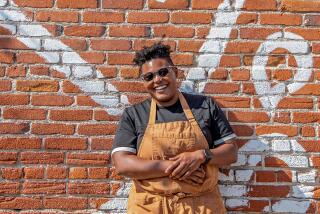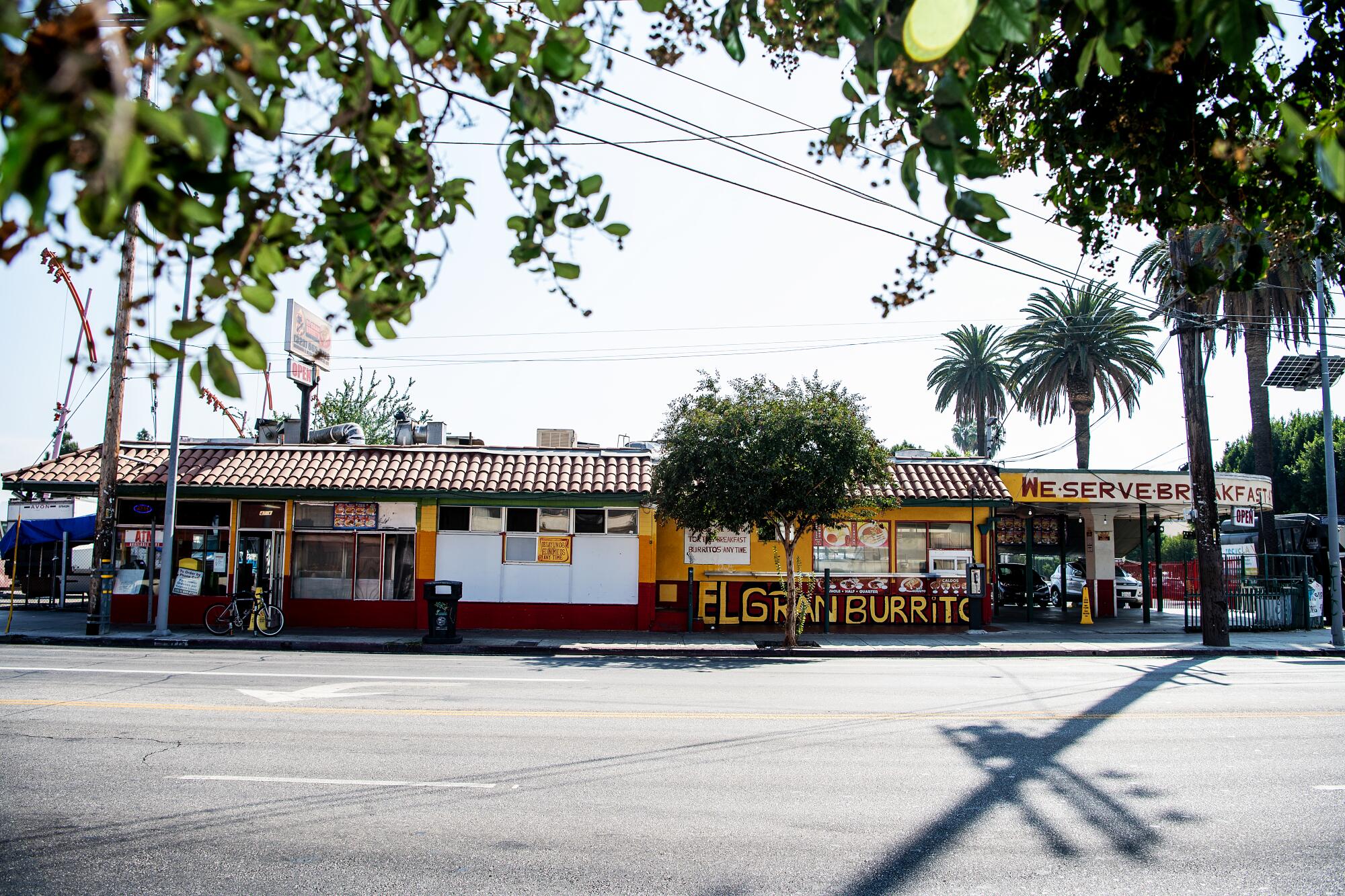
“WE SERVE TORTAS BREAKFAST BURRITOS ANYTIME,” the sign screams in capital letters — and for a long time that proclamation painted in red on the side of El Gran Burrito was true.
“¡Treinta años!” restaurant owner Pedro Davila says, his eyes glimmering, as he continues in Spanish. “We had the pride of saying, ‘30 years and we’ve never closed.’”
Then came the pandemic.
Until March, his East Hollywood spot dished out house specialties, including its forte, carne asada tacos, 24 hours a day from the sprawling yellow building near the intersection of Santa Monica Boulevard and Vermont Avenue.
At night, the smell of charred chicken sizzling on an outside spit often wafted through the neighborhood, magnetizing Metro riders as they emerged from underground escalators. But then people began burrowing indoors, sales shriveled and, to minimize losses, the cash-only spot started closing between 10 p.m. and 6 a.m.
“It gave me a deep sadness,” Davila said, sighing. “But we’re still here.”
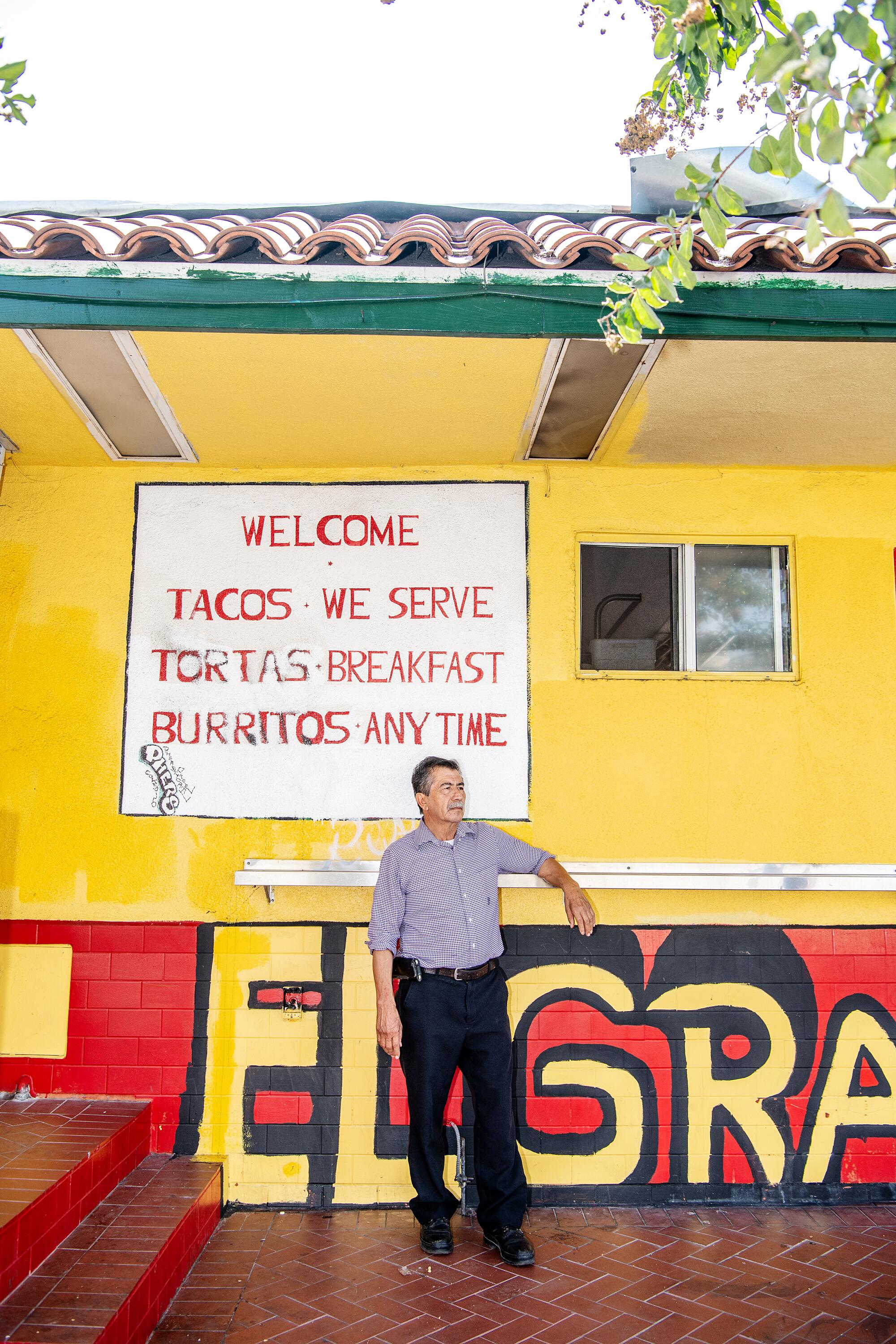
Although Davila and his wife, Guadalupe, the restaurant’s longtime chef, couldn’t have anticipated the pandemic, they’ve had a couple of years to prepare for the reality that a big change was coming for their beloved restaurant. If plans stay on schedule, the building the Davilas have rented since 1990 will be razed to the ground sometime before late 2021, when construction is slated to begin on an affordable-housing project.
The 187-apartment complex — rentable units reserved exclusively for low-income households as well as some retail space on the ground level — is a partnership between nonprofit developer Little Tokyo Service Center and Metro, which has said the project will provide new shade and seating options at its busy Vermont/Santa Monica station.
The immediate need for more affordable housing options near the intersection is undeniable: Families live out of their vans parked on side streets, people drag abandoned mattresses into pockets of shade for afternoon naps and a recent tally found nearly 4,000 people in the council district are experiencing homelessness.
Davila, who lives a few blocks west of the restaurant, said he noticed the number of people sleeping on sidewalks in the neighborhood increased drastically four years ago. So much suffering, he said, even before the pandemic.
“For many people, there is no light at the end of the tunnel.”
Above all, the 70-year-old businessman, who grew up on a ranch in the Mexican state of Puebla, says he’s grateful for the long lives and careers that he and Guadalupe, 61, have built together over the years, first with a series of taco trucks that traversed the Southland and eventually within these yellow walls.
“Estamos a gusto.”
::
From his corner-lot restaurant, Davila has watched as the neighborhood has evolved.
He remembers the Armenian families who lived down the street in the 1990s and the countless customers he’s served — Los Angeles City College students, nurses from Hollywood Presbyterian, Central American immigrants who endearingly trained him to put the spicy salsa on the side.
He easily ticks off a list of nearby businesses that have since shuttered, including a dentist’s office, a pancake shop and a place that sold windshields. When the Metro stop opened in 1999, he quickly realized that most people weren’t going to stop in for a snack but instead would sprint to the bus stop across the street. Human beings, he learned, are always on the go.
“The poor are running to try to get ahead, and the rich keep running because they don’t want to be passed.”
Davila, who is Catholic, said he and his wife often petitioned God to place into their path people whom they were meant to serve. Early in the pandemic, he posted a sign offering a plate of free food to anyone in need, but he eventually removed it, noticing a few people seemed to be abusing the offer.
Twelve years ago, Oswar Perez, then 18, asked Davila for work but explained he didn’t know how to cook or even how to sweep the floor. His now-boss saw potential in him, Perez said, and has since taught him tidbits of wisdom, including, a favorite proverb, “You reap what you sow.”
“We’re going to teach you,” Davila told him that day. “You will learn.”
::
Before the pandemic, the restaurant had an early morning rush, a lunch crush and then another swell around 6 p.m., as families settled into outside booths, sharing horchata and costillas en salsa verde.
But perhaps the busiest shift of all came after dark.
“Like most great Los Angeles taco places,” Jonathan Gold wrote in a 1996 profile, “El Gran Burrito is less notable for the food served inside the restaurant than for the food served out back on evenings and on weekends.”
For years, the outside area got especially packed on weekends after closing time at a cluster of gay dance clubs nearby, Davila recalled, saying he created a special menu item called “el burrito gay” — essentially a regular burrito with cheese on top — out of gratitude to the loyal LGBTQ customer base.
“Gay clients are who really made the business a success,” he said, proudly.
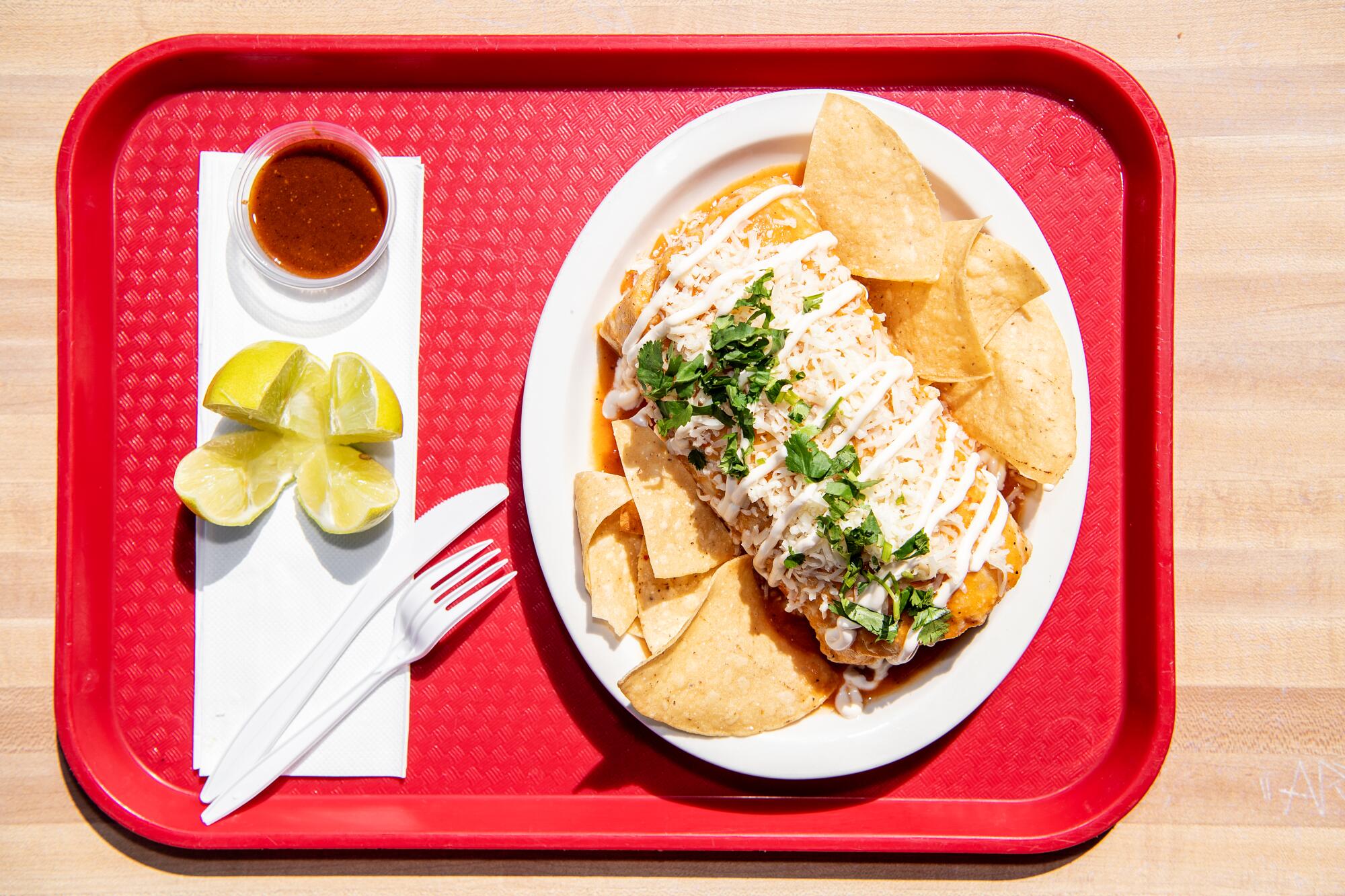
A lot of credit belongs to his wife, he said, who perfected many of her recipes over long-distance phone calls to Mexico.
“How do you make menudo?” Guadalupe once asked her mother.
“Mija, if you make it with love, it will come out well,” her mother said. “If not, it won’t.”
The restaurant is like a second home, Guadalupe says, explaining that when their five children were younger they often hung out in the small office off the kitchen before and after school, napping under the wooden desk. While out running errands over the years, people sometimes recognized her, Guadalupe said, asking if she was “la señora del Gran Burrito.”
“I told them, ‘No, I’m la señora de Don Pedro,’” she said, as her husband chuckled.
The couple met in L.A. and married in the mid-1970s.
With a $10,000 loan from a friend turned business partner, the Davilas bought cooking supplies and a taco truck they christened “Tacos El Conquistador.” With their friend as well as another colleague from a previous restaurant job, the Davilas started selling food along a busy strip in Lincoln Park.
Their business boomed, especially late at night when restaurants were closed, and within a year, Davila paid off the loan. Then, early one morning in 1977, a group of men rushed onto the truck, stealing money and slashing Davila’s left forearm with one of his cooking knives. When the truck was targeted again six months later, they knew it was time to move on.
They did stints in Santa Monica and then in Pico-Union, where loyal customers told them they enjoyed the food but disliked the drug dealers sorting their stashes on tables Davila set up nearby. One night, when they had the truck parked outside El Sombrero dance club in North Hollywood, Davila spotted a drunk guy stumbling toward him.
“Hey!” the man shouted. “Gimme my big burrito!”
The phrase stuck and, when translated, became “El Gran Burrito.”
By 1987, eager for a fixed locale, Davila rented a spot at Santa Monica Boulevard and Virgil Avenue. Business flourished, especially on nights of soccer or boxing matches. During a hyped fight between Mexican champion Julio César Chávez and Héctor “Macho” Camacho, the Puerto Rican boxer, so many people packed around the restaurant’s television that they spilled out onto the sidewalk.
Soon, a red vehicle drove by and made a U-turn. A fire department employee hopped out and Davila, who said he’s prone to confront things head on, introduced himself as the owner. The man told him he could either shut down voluntarily or get shut down, so Davila immediately walked over to the loudspeaker he used to announce food orders.
“Señores, discúlpenme!” Davila boomed. Forgive me, but the law is outside, he said, and we have to shut this down.
“Nooooo!” they pleaded. “Just wait. It’s almost over.”
He still smirks at the image of some 300 people sulking away from the restaurant before the fight ended.
Before long, the building’s owner told Davila she intended to sell the property to the city, so he scouted a new location a few blocks west. He cut a deal with two Pakistani immigrants who ran a 99-cent store, subleasing the building from them.
It was 1990 and, after some serious renovations, El Gran Burrito officially opened in its current digs.
Through the years, as rent went from $3,000 to $3,500 and later to $10,000, Davila had hoped to buy the building, but the former landlord didn’t want to sell, he said. For a long time the restaurant had multiyear leases, but for the past few years, he said, it has operated on a month-to-month agreement, knowing that, at some point, construction on the new project will begin.
The poor are running to try to get ahead, and the rich keep running because they don’t want to be passed.
— Pedro Davila
It will be painful to say goodbye. But the couple’s children hope to carry on the family restaurant at another location, Davila said, and after decades of work, he and his wife could use a break.
And for now, they’re focused on getting through the pandemic.
On a recent morning, Davila reached into his right pocket, pulling out two folded five-dollar bills and two singles — $12 in sales so far that day, he said, when before the pandemic, it would have been closer to $400.
The restaurant has cut back hours and gone from 16 employees to eight, Davila said, adding many former employees told him they couldn’t make enough working a reduced schedule and needed to find new jobs. He understood. Guadalupe said she worries about how employees will eat with reduced paychecks.
“We don’t know what will happen,” she said. “Whatever God wills.”
On a recent Thursday morning, a customer peeked up at the television tuned to Univision, which was airing a segment about Latino children who have died from COVID-19. The man sighed, before ordering huevos rancheros. Behind the counter, Rosa Avila, 60, wiped her hands on her black apron.
“My first job and my only job,” Avila said, explaining that she has worked for the Davilas since 1987, soon after she moved to Los Angeles from the Mexican state of Durango.
Her three children grew up with the Davila children, she said, and she has many memories in this building, including years of Christmas parties, when employees and their families gathered for baked ham and macaroni salad. The Davilas have been exceedingly understanding bosses, she said, and while she knows the pandemic has been deeply discouraging for them, she thanks God El Gran Burrito has managed to stay open.
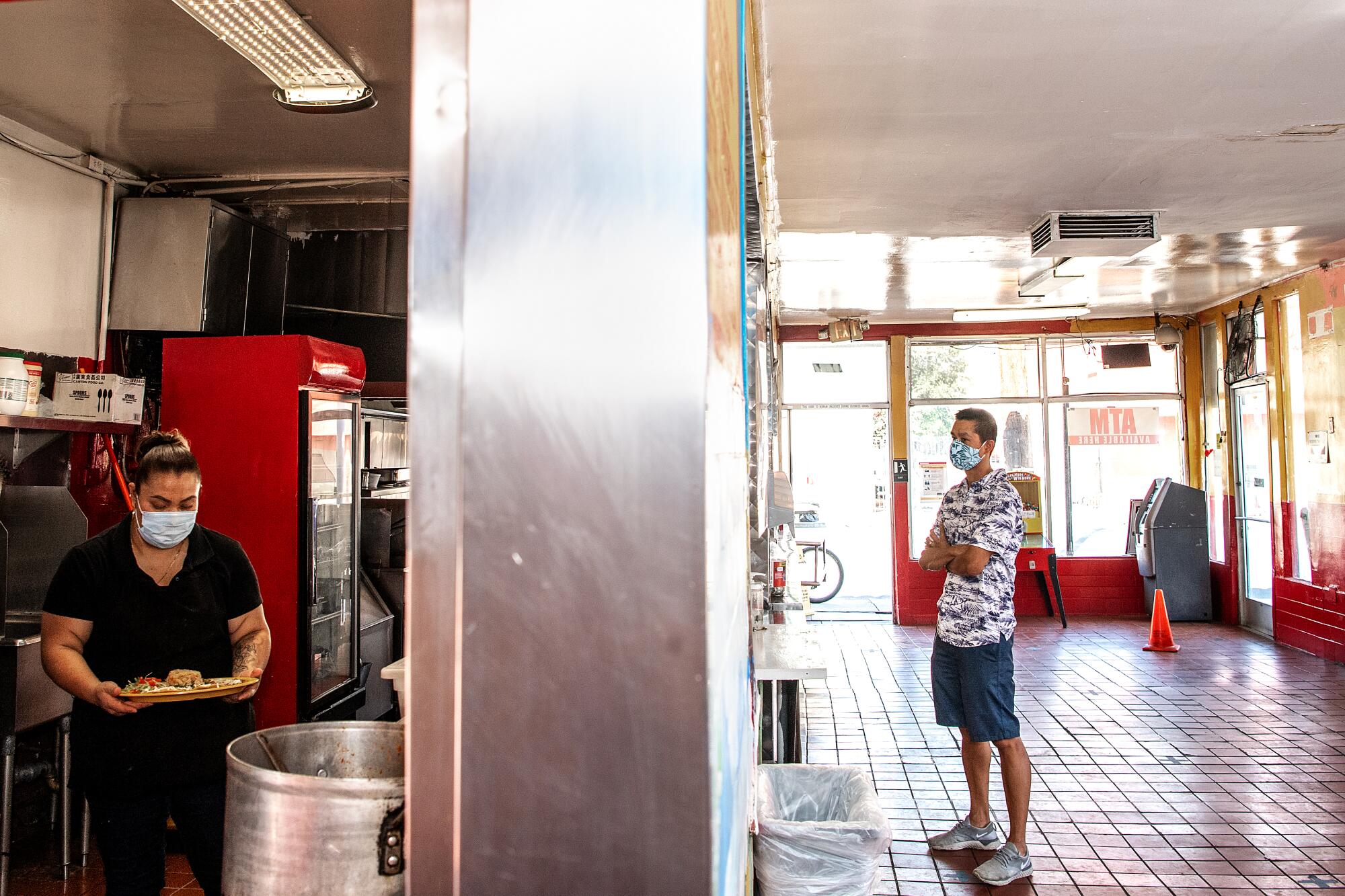
At a table outside, Jose Sandoval, 65, popped open his to-go container and watched steam levitate above a heaping mound of eggs and chorizo. The now-retired valet, who emigrated from El Salvador in 1973, lives nearby and started coming to the restaurant decades ago, when it was off Virgil Avenue.
“I’ve always followed him,” he said, pointing at Davila, “because the food is good and the prices are reasonable.”
He especially appreciates the free coffee refills.
“Try getting a refill at 7-Eleven,” he quipped. “Here, they treat us well.”
As Davila wiped down a nearby table, he smiled over at Sandoval.
“Buen provecho.”
“Gracias, amigo.”
More to Read
Eat your way across L.A.
Get our weekly Tasting Notes newsletter for reviews, news and more.
You may occasionally receive promotional content from the Los Angeles Times.


